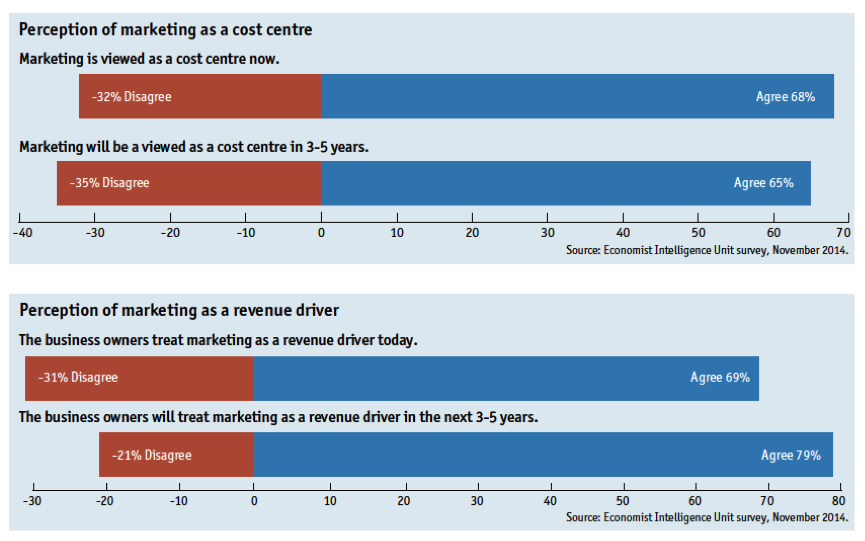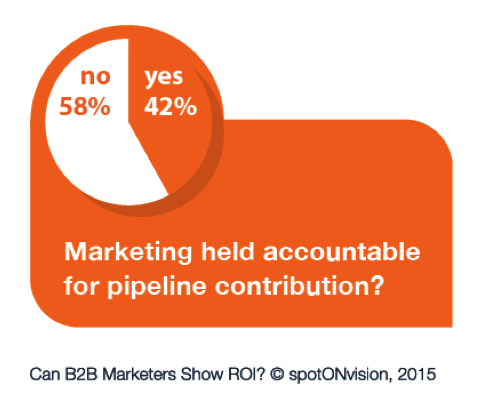The new marketer: marketing no longer a cost center (1)

The Economist recently published the report ‘The rise of the marketer: driving engagement, experience and revenue.’ It is a survey of CMOs worldwide which looks at the way marketers perceive the current changes in marketing and how they embrace it. I’m curious about the differences between the marketing trends identified internationally versus what is happening in the Netherlands.
- Marketers who participated in the study ‘The rise of the marketer’ see the following changes:
- Increasingly, Marketing is seen less as a cost, and more as a source of revenue
- Marketing takes the lead in customer experience
- Engagement with the customer is critical
- Operational and data skills are important, particularly in combination with the understanding of the big picture
- Technology investment mainly goes to digital and data areas
- Trends to monitor: real-time personalized mobile and the Internet of Things
When reading about changes and trends, it is inevitable that they sometimes seem obvious. This is mainly because a trend or a prediction does not suddenly arise; an idea develops slowly, seeping into our consciousness. There are precursors – the first tentative steps in the race to innovate. And from there the course is not well defined – it can take years before the vast majority complete the same learning curve.
All in all, it’s an insightful list of trends supported by 478 global marketers (B2C and B2B), including 30 per cent from Europe, as well as a series of in-depth interviews with senior executives. Our own soon-to-be-published research on marketing performance management in the Netherlands substantiates these results.
Marketing no cost center anymore
Management guru Peter Drucker once said that marketing would make the role of sales unnecessary. It is true that marketers are moving further into the sales funnel, according to The rise of the marketer. Additionally, marketers are increasingly responsible for e-commerce sales, sometimes even with their own profit and loss responsibility. For many of the marketers surveyed is not so black and white but there is definitely a higher level of accountability and the contribution to the revenue increases.
The same survey asked about the expectations of this balance for the coming years and we see a slow shift. It seems clear that marketing will be seen less and less as a cost center and more as a value-add that contributes to revenue (see the chart).
As mentioned, this topic is also addressed in a qualitative study on B2B marketing performance management in the Netherlands. 26 CMOs of large B2B companies were asked if marketing is responsible for contributing to the sales targets.

Does marketing contribute to sales?

Adwin Gerritsen, a consultant at SPOTONVISION: “During the interviews with the participants in the study, it became clear that the parties involved at the board level do not always have a clear picture of what marketing can achieve. More than half top-level marketing executives indicate that they are not held responsible for the marketing’s contribution to the pipeline.”
The ability of B2B marketers to show how marketing contributes to revenue depends on many factors. Typically CMOs did not have the right data to demonstrate the added value of marketing within their company. This lack of evidence has led to the perception that marketing does not make an important contribution to revenue.
Tangible value
“With the advent of CRM, marketing automation and data visualization solutions, marketers now more than ever have the tools to prove the value of marketing and communication. But it’s more than just the technology. B2B marketers are expected to increasingly improve efficiency and effectiveness and increase the added value of marketing within the organization. This requires more expertise in the field of marketing performance management“, said Adwin Gerritsen.
In line with the global trend of accountability, we see that in the Netherlands, marketers also are working hard to make visible the marketing contribution. To come back to management guru Peter Drucker: “What gets measured gets managed.” In other words, the only way for marketing to avoid being pegged a cost-center, is to make marketing measurable.
As John Dragoon, EVP and CMO of publisher Houghton Mifflin Harcourt says: “If you do not accept accountability for being measured in terms of your contributions and outputs, then you are viewed as a cost center.”
The game has begun
Marketers worldwide see the trend ‘from a cost center to revenue driver.’ They are open and aware that it is inevitable. Furthermore, as shown by both the international and the Dutch study, the measurability of marketing is high on the CMO’s agenda. How long it takes until the majority follow the leaders in this area, we do not know. But it is quite clear, that this is the direction the market is moving.
Share this article
Related insights
Grow your B2B Marketing knowledge
Subscribe to keep up with our latest B2B Marketing updates and exclusive events. Straight to your inbox, once a month.



